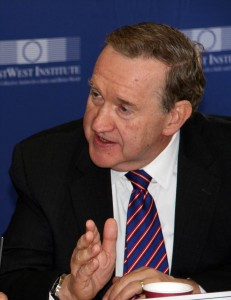
NEW YORK—John Edwin Mroz, 66, founder and CEO of the EastWest Institute (EWI) an influential research and policy group that worked behind the scenes with governments involved in the Cold War, the Israel-Palestinian conflict, superpower relations between the United States and China, and elsewhere, died on August 15, 2014from complications of a blood cancer and macrophage activation syndrome (MAS), said his wife, Karen Linehan Mroz.
Mroz was born and raised in Westfield, Massachusetts. He graduated from St. Mary’s High School in Westfield. After completing his undergraduate studies at the University of Notre Dame and a Master’s at Northeastern University, he completeda Master of Arts in Law and Diplomacy and his doctoral studies at the Fletcher School of Law and Diplomacy.
Mroz was serving as director of Middle East studies at the International Peace Academy in June of 1981 when he was handed a Palestinian Liberation Organization memorandum that made reference to the state of Israel and the right of states to live in peace, a central point of contention dividing Israelis and Palestinians for decades. Mroz contacted the Reagan Administration and received approval to conduct a series of clandestine conversations with the Palestinian leadership, as there were no formal talks permitted at the time because of the PLO’s failure to recognize the state of Israel. He met with PLO leader Yasser Arafat more than 50 times over three years
Though the talks did not succeed, Mroz established himself with officials in Washington officials, the Middle East and more broadly as a reliable go-between, a faculty he employed again and again throughout his career. The Middle East conversations also introduced Mroz to Ira D. Wallach, then head of Central National Gottesman and now deceased, a marketer of paper and pulp products. Together in 1981, with Wallach as initial benefactor, they founded the Institute for East-West Security Studies and later became the EastWest Institute based in New York, focusing its mission in the 1980s on addressing and helping resolve underlying conflicts in the Cold War.
In the 1980s and ‘90sMroz made hundreds of trips to the Soviet Union, its successor states including Russia, Ukraine, and other Central and Eastern European states. Moving quickly after the fall of the Berlin Wall in October 1989, Mroz opened a European headquarters in Prague and reinvented the institute to deal with the full array of challenges associated with the post-communist transitions of Central and Eastern Europe and the former Soviet Union, including political and economic reform and new arrangements of international security.
Recruiting a multi-disciplinary and international staff, promoting leadership from the region, and later opening satellite offices in Warsaw, Budapest, Kiev, and Moscow, the institute adopted a new name to accompany its new mission, the EastWest Institute. In the late 1990s and early 2000s, he advanced the institute’s reach to Central Asia and China, anticipating the shift in global power.The institute’s May 2014 board meeting was held in Moscow during the global response to Russia’s annexation of Crimea, though Mroz was hospitalized and unable to attend.
Current EWI work focuses heavily on efforts to establish a stronger and more positive US-China relationship especially in the political and security arenas. EWI pioneered a rigorous focus on the international challenges of international cyber security, holding the first worldwide summit in 2009 in Dallas. Additional work focuses on the challenges of food, water, and energy. In February, shortly before he was diagnosed with a non-Hodgkin T-cell lymphoma,Mroz chaired a panel on transatlantic relations at the 2014 Munich Security Conference. He had largely recovered from a bout with macrophage activation syndrome in early 2012, though it recurred as the blood cancer emerged.
Mroz was the recipient of numerous international awards including the Order of Merit from the Federal Republic of Germany, for the role he and EWI played in facilitating German reunification.He was also awarded the highest civilian awards given to non-citizens by the Presidents of Slovakia and Romania. In addition to his advisory work for the United States, Mroz assisted more than 20 governments including Germany, Turkey, Ukraine, Poland, and the Russian Federation, in addition to the G-8, the European Union, the African Union, NATO, and the Council of Europe.
Mroz was author of a book on the Israeli-Palestinian conflict, “Beyond Security: Private Perceptions Among Arabs and Israelis,” and contributed to Foreign Affairs magazine and numerous other publications. The institute grew to become a major global policy organization, publishing articles and books, and with significant contacts in international business as well as government. Among its 40 board members are Ross Perot, Jr., board chair, Dr. Armen Sarkissian, board vice chairman and former prime minister of Armenia and founding president of Eurasia House International; Leo Schenker, board treasurer and senior advisor at Central-National Gottesman Inc.; Martti Ahtisaari, former president of Finland and recipient of the 2008 Nobel Peace Prize; Kim Campbell, former prime minister of Canada; Michael Chertoff, former secretary of the U.S. Department of Homeland Security and co-founder of the Chertoff Group; Gen. (Ret.) James L. Jones, former national security adviser to President Obama; Stephen B. Heintz, president of the Rockefeller Brothers Fund; Dr. Hu Yuandong, chief representative of the United Nations Industrial Development Organization Investment and Technology Promotion Office for China in Beijing; Ambassador Wolfgang Ischinger, chairman of the Munich Security Conference and global head of government relations, Allianz SE; George F, Russell, Jr., investor and international philanthropist, and Haifa Fahoum Al Kalyani, founder and chairman of the Arab International Women’s Forum. A complete list of the board is available on the institute’s website.
Mroz leaves his beloved wife Karen Linehan Mroz, President of the Middle East Children’s Institute (MECI), three grown children, Jonathan Mroz, Jessica Mroz Stewart, and Jeffrey Mroz, and his granddaughter Noel Isabella Mrozand brothers, Thomas Mroz and Robert Mroz of North Carolina.
A memorial will be scheduled at a later date. The family requests that in lieu of flowers, donations be given in John’s name to his beloved EastWest Institute in New York City http://www.ewi.info/donate.

